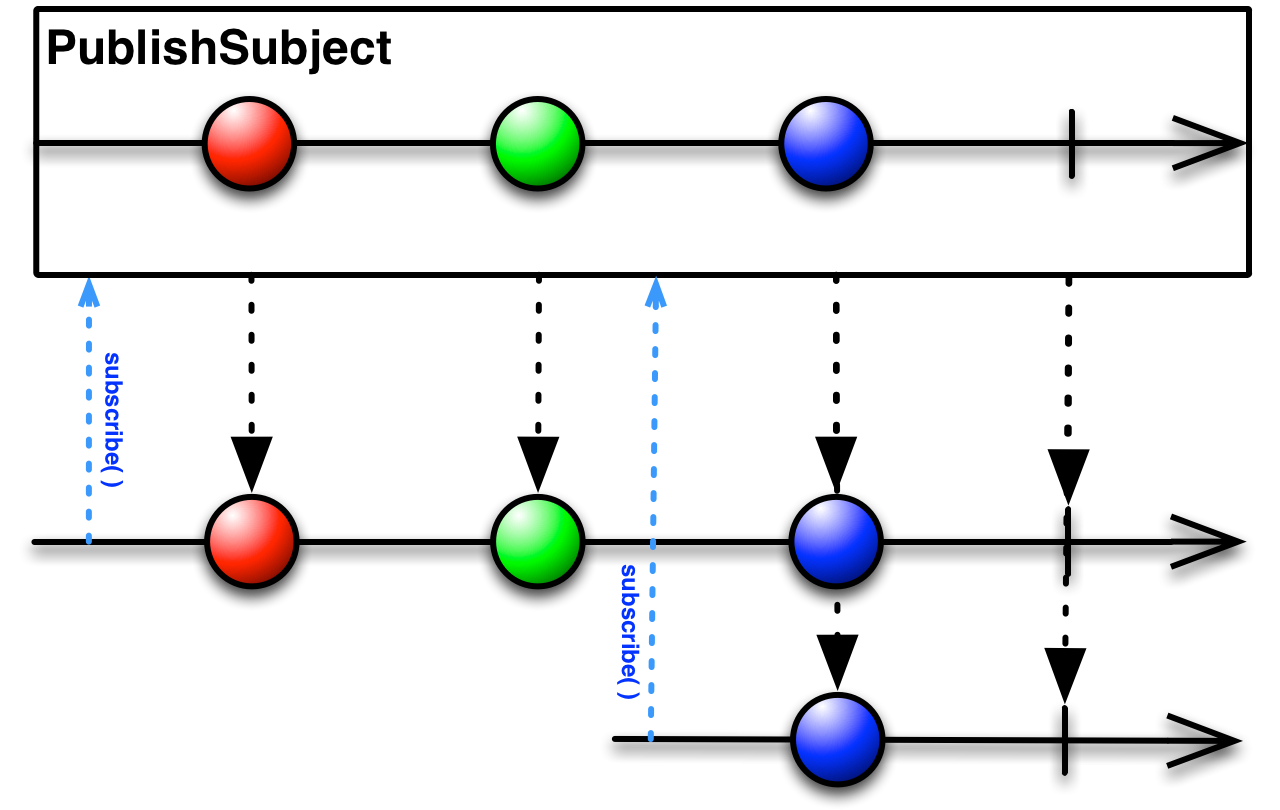
rx.subjects.TestSubject Maven / Gradle / Ivy
Go to download
Show more of this group Show more artifacts with this name
Show all versions of rxjava-core Show documentation
Show all versions of rxjava-core Show documentation
rxjava-core developed by Netflix
/**
* Copyright 2014 Netflix, Inc.
*
* Licensed under the Apache License, Version 2.0 (the "License");
* you may not use this file except in compliance with the License.
* You may obtain a copy of the License at
*
* http://www.apache.org/licenses/LICENSE-2.0
*
* Unless required by applicable law or agreed to in writing, software
* distributed under the License is distributed on an "AS IS" BASIS,
* WITHOUT WARRANTIES OR CONDITIONS OF ANY KIND, either express or implied.
* See the License for the specific language governing permissions and
* limitations under the License.
*/
package rx.subjects;
import java.util.concurrent.TimeUnit;
import rx.Observer;
import rx.Scheduler;
import rx.functions.Action0;
import rx.functions.Action1;
import rx.internal.operators.NotificationLite;
import rx.schedulers.TestScheduler;
import rx.subjects.SubjectSubscriptionManager.SubjectObserver;
/**
* Subject that, once an {@link Observer} has subscribed, publishes all subsequent events to the subscriber.
*
*  *
*
* Example usage:
*
*
{@code
PublishSubject
*
* @param
* the type of item observed by and emitted by the subject
* @warn javadoc seems misleading
*/
public final class TestSubject extends Subject {
/**
* @warn javadoc missing
* @return
*/
public static TestSubject create(TestScheduler scheduler) {
final SubjectSubscriptionManager state = new SubjectSubscriptionManager();
state.onAdded = new Action1>() {
@Override
public void call(SubjectObserver o) {
o.emitFirst(state.get(), state.nl);
}
};
state.onTerminated = state.onAdded;
return new TestSubject(state, state, scheduler);
}
private final SubjectSubscriptionManager state;
private final Scheduler.Worker innerScheduler;
protected TestSubject(OnSubscribe onSubscribe, SubjectSubscriptionManager state, TestScheduler scheduler) {
super(onSubscribe);
this.state = state;
this.innerScheduler = scheduler.createWorker();
}
@Override
public void onCompleted() {
onCompleted(innerScheduler.now());
}
private void _onCompleted() {
if (state.active) {
for (SubjectObserver bo : state.terminate(NotificationLite.instance().completed())) {
bo.onCompleted();
}
}
}
/**
* @warn javadoc missing
* @param timeInMilliseconds
*/
public void onCompleted(long timeInMilliseconds) {
innerScheduler.schedule(new Action0() {
@Override
public void call() {
_onCompleted();
}
}, timeInMilliseconds, TimeUnit.MILLISECONDS);
}
@Override
public void onError(final Throwable e) {
onError(e, innerScheduler.now());
}
private void _onError(final Throwable e) {
if (state.active) {
for (SubjectObserver bo : state.terminate(NotificationLite.instance().error(e))) {
bo.onError(e);
}
}
}
/**
* @warn javadoc missing
* @param e
* @param timeInMilliseconds
*/
public void onError(final Throwable e, long timeInMilliseconds) {
innerScheduler.schedule(new Action0() {
@Override
public void call() {
_onError(e);
}
}, timeInMilliseconds, TimeUnit.MILLISECONDS);
}
@Override
public void onNext(T v) {
onNext(v, innerScheduler.now());
}
private void _onNext(T v) {
for (Observer o : state.observers()) {
o.onNext(v);
}
}
/**
* @warn javadoc missing
* @param v
* @param timeInMilliseconds
*/
public void onNext(final T v, long timeInMilliseconds) {
innerScheduler.schedule(new Action0() {
@Override
public void call() {
_onNext(v);
}
}, timeInMilliseconds, TimeUnit.MILLISECONDS);
}
}
© 2015 - 2025 Weber Informatics LLC | Privacy Policy